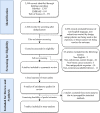Association of antipsychotic use with breast cancer: a systematic review and meta-analysis of observational studies with over 2 million individuals
- PMID: 36059215
- PMCID: PMC9483823
- DOI: 10.1017/S2045796022000476
Association of antipsychotic use with breast cancer: a systematic review and meta-analysis of observational studies with over 2 million individuals
Erratum in
-
Association of antipsychotic use with breast cancer: a systematic review and meta-analysis of observational studies with over 2 million individuals-CORRIGENDUM.Epidemiol Psychiatr Sci. 2022 Sep 27;31:e66. doi: 10.1017/S2045796022000531. Epidemiol Psychiatr Sci. 2022. PMID: 36165238 Free PMC article. No abstract available.
Abstract
Aims: Despite reports of an elevated risk of breast cancer associated with antipsychotic use in women, existing evidence remains inconclusive. We aimed to examine existing observational data in the literature and determine this hypothesised association.
Methods: We searched Embase, PubMed and Web of Science™ databases on 27 January 2022 for articles reporting relevant cohort or case-control studies published since inception, supplemented with hand searches of the reference lists of the included articles. Quality of studies was assessed using the Newcastle-Ottawa Scale. We generated the pooled odds ratio (OR) and pooled hazard ratio (HR) using a random-effects model to quantify the association. This study was registered with PROSPERO (CRD42022307913).
Results: Nine observational studies, including five cohort and four case-control studies, were eventually included for review (N = 2 031 380) and seven for meta-analysis (N = 1 557 013). All included studies were rated as high-quality (seven to nine stars). Six studies reported a significant association of antipsychotic use with breast cancer, and a stronger association was reported when a greater extent of antipsychotic use, e.g. longer duration, was operationalised as the exposure. Pooled estimates of HRs extracted from cohort studies and ORs from case-control studies were 1.39 [95% confidence interval (CI) 1.11-1.73] and 1.37 (95% CI 0.90-2.09), suggesting a moderate association of antipsychotic use with breast cancer.
Conclusions: Antipsychotic use is moderately associated with breast cancer, possibly mediated by prolactin-elevating properties of certain medications. This risk should be weighed against the potential treatment effects for a balanced prescription decision.
Keywords: Antipsychotics; chronic conditions; drug side effects other; epidemiology; multimorbidity.
Figures



Similar articles
-
Risk of Breast Cancer With Prolactin Elevating Antipsychotic Drugs: An Observational Study of US Women (Ages 18-64 Years).J Clin Psychopharmacol. 2022 Jan-Feb 01;42(1):7-16. doi: 10.1097/JCP.0000000000001513. J Clin Psychopharmacol. 2022. PMID: 34864772 Free PMC article.
-
Understanding the Limitations of the Odds Ratio in a Case-Control Study of the Association Between Breast Cancer and Exposure to Antipsychotic Drugs.J Clin Psychiatry. 2021 Nov 23;82(6):21f14319. doi: 10.4088/JCP.21f14319. J Clin Psychiatry. 2021. PMID: 34813689
-
Post-diagnostic antipsychotic use and cancer mortality: a population based cohort study.BMC Cancer. 2020 Aug 24;20(1):804. doi: 10.1186/s12885-020-07320-3. BMC Cancer. 2020. PMID: 32831062 Free PMC article.
-
Association Between Alzheimer Disease and Cancer With Evaluation of Study Biases: A Systematic Review and Meta-analysis.JAMA Netw Open. 2020 Nov 2;3(11):e2025515. doi: 10.1001/jamanetworkopen.2020.25515. JAMA Netw Open. 2020. PMID: 33185677 Free PMC article.
-
Risk of breast cancer among patients with psoriasis: a systematic review and meta-analysis.Arch Dermatol Res. 2023 Dec 1;316(1):12. doi: 10.1007/s00403-023-02753-9. Arch Dermatol Res. 2023. PMID: 38038780
Cited by
-
Antipsychotics use increases the risk of breast cancer in Women: Findings from systematic review and meta-analysis of observational studies.Compr Psychoneuroendocrinol. 2025 Jul 24;24:100313. doi: 10.1016/j.cpnec.2025.100313. eCollection 2025 Nov. Compr Psychoneuroendocrinol. 2025. PMID: 40800719 Free PMC article. Review.
-
The incidence risk of gynecological cancer by antipsychotic use: a meta-analysis of 50,402 patients.BMC Cancer. 2024 Jun 10;24(1):712. doi: 10.1186/s12885-024-12481-6. BMC Cancer. 2024. PMID: 38858638 Free PMC article.
-
Antipsychotic-induced hyperprolactinemia: Toxicologic mechanism and the increased breast cancer risk.Toxicol Rep. 2025 Feb 1;14:101927. doi: 10.1016/j.toxrep.2025.101927. eCollection 2025 Jun. Toxicol Rep. 2025. PMID: 39989981 Free PMC article. Review.
-
BREAST CANCER AND PROLACTIN: A LIFETIME RELATIONSHIP.Acta Endocrinol (Buchar). 2024 Jul-Sep;20(3):349-355. doi: 10.4183/aeb.2024.349. Epub 2025 May 23. Acta Endocrinol (Buchar). 2024. PMID: 40530105 Free PMC article.
-
Antipsychotic Use and Risk of Breast Cancer in Women With Severe Mental Illness: Replication of a Nationwide Nested Case-Control Database Study.Schizophr Bull. 2024 Nov 8;50(6):1471-1481. doi: 10.1093/schbul/sbae058. Schizophr Bull. 2024. PMID: 38687213 Free PMC article.
References
-
- Ajmal A, Joffe H and Nachtigall LB (2014) Psychotropic-induced hyperprolactinemia: a clinical review. Psychosomatics 55, 29–36. - PubMed
-
- Anmella G, Fico G, Lotfaliany M, Hidalgo-Mazzei D, Soto-Angona Ó, Giménez-Palomo A, Amoretti S, Murru A, Radua J, Solanes A, Pacchiarotti I, Verdolini N, Cowdery S, Dodd S, Williams LJ, Mohebbi M, Carvalho AF, Kessing LV, Vieta E and Berk M (2021) Risk of cancer in bipolar disorder and the potential role of lithium: international collaborative systematic review and meta-analyses. Neuroscience & Biobehavioral Reviews 126, 529–541. - PubMed
-
- Balt SL, Galloway GP, Baggott MJ, Schwartz Z and Mendelson J (2011) Mechanisms and genetics of antipsychotic-associated weight gain. Clinical Pharmacology & Therapeutics 90, 179–183. - PubMed
-
- Besnard I, Auclair V, Callery G, Gabriel-Bordenave C and Roberge C (2013) Antipsychotic-drug-induced hyperprolactinemia: physiopathology, clinical features and guidance. L'encephale 40, 86–94. - PubMed
Publication types
MeSH terms
Substances
LinkOut - more resources
Full Text Sources
Medical

